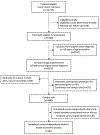Prevalence and predictors of cancer-related worry and associations with health behaviors in adult survivors of childhood cancer
- PMID: 33844273
- PMCID: PMC8323824
- DOI: 10.1002/cncr.33563
Prevalence and predictors of cancer-related worry and associations with health behaviors in adult survivors of childhood cancer
Abstract
Background: Cancer-related worry (CRW) is common among cancer survivors; however, little is known about factors associated with CRW or its impact on health behaviors in adult survivors of childhood cancer.
Methods: Survivors in the St. Jude Lifetime Cohort Study (n = 3211; 51% male; mean age, 31.2 years [SD, 8.4 years]; mean time after diagnosis, 22.8 years [SD, 8.3 years]) underwent medical evaluations and completed ratings of CRW, psychological symptoms, and health behaviors. Multivariable modified Poisson regression models examined associations between CRW and treatment exposures, chronic health conditions, psychological symptoms, and health behaviors.
Results: Sixty-four percent of survivors (95% confidence interval [CI], 62.6-65.9) reported worry about subsequent malignancy, 45% (95% CI, 43.5-46.9) reported worry about physical problems related to cancer, and 33% (95% CI, 31.2-34.4) reported worry about relapse. Multiple psychological symptoms, treatment exposures, and chronic conditions significantly increased the risk of CRW. Survivors reporting CRW were at increased risk for substance use, inadequate physical activity, and increased health care utilization after adjustments for chronic conditions. For example, with adjustments for chronic conditions, those who endorsed CRW were more likely to have ≥5 cancer-related physician visits, ≥5 physician visits related to cancer, and ≥5 calls to a physician's office in the previous 2 years in comparison with survivors who were not worried. CRW was also associated with an increased risk of current tobacco use, past marijuana use, and current marijuana use.
Conclusions: A substantial proportion of adult survivors of childhood cancer reported CRW associated with increased health care utilization. CRW may serve as an intervention target to promote well-being and adaptive health behaviors.
Keywords: cancer survivors; childhood cancer; health behavior; health care utilization; worry.
© 2021 American Cancer Society.
Conflict of interest statement
Conflicts of interest:
The authors declare no conflicts of interest.
Figures
Similar articles
-
Cancer-Related Worry as a Predictor of 5-yr Physical Activity Level in Childhood Cancer Survivors.Med Sci Sports Exerc. 2023 Sep 1;55(9):1584-1591. doi: 10.1249/MSS.0000000000003195. Epub 2023 Apr 22. Med Sci Sports Exerc. 2023. PMID: 37093894 Free PMC article.
-
Health behavior profiles in young survivors of childhood cancer: Findings from the St. Jude Lifetime Cohort Study.Cancer. 2023 Jul 1;129(13):2075-2083. doi: 10.1002/cncr.34749. Epub 2023 Mar 21. Cancer. 2023. PMID: 36943740 Free PMC article.
-
Posttraumatic stress as a contributor to behavioral health outcomes and healthcare utilization in adult survivors of childhood cancer: a report from the Childhood Cancer Survivor Study.J Cancer Surviv. 2019 Dec;13(6):981-992. doi: 10.1007/s11764-019-00822-5. Epub 2019 Nov 5. J Cancer Surviv. 2019. PMID: 31691097 Free PMC article.
-
Psychological Symptoms, Social Outcomes, Socioeconomic Attainment, and Health Behaviors Among Survivors of Childhood Cancer: Current State of the Literature.J Clin Oncol. 2018 Jul 20;36(21):2190-2197. doi: 10.1200/JCO.2017.76.5552. Epub 2018 Jun 6. J Clin Oncol. 2018. PMID: 29874134 Free PMC article. Review.
-
A model linking uncertainty, post-traumatic stress, and health behaviors in childhood cancer survivors.Oncol Nurs Forum. 2009 Jan;36(1):E20-30. doi: 10.1188/09.ONF.E20-E30. Oncol Nurs Forum. 2009. PMID: 19136328 Review.
Cited by
-
The links between symptom burden, illness perception, psychological resilience, social support, coping modes, and cancer-related worry in Chinese early-stage lung cancer patients after surgery: a cross-sectional study.BMC Psychol. 2024 Aug 31;12(1):463. doi: 10.1186/s40359-024-01946-9. BMC Psychol. 2024. PMID: 39217397 Free PMC article.
-
Fear of Cancer Recurrence in Adult Survivors of Childhood Cancer.JAMA Netw Open. 2024 Oct 1;7(10):e2436144. doi: 10.1001/jamanetworkopen.2024.36144. JAMA Netw Open. 2024. PMID: 39361286 Free PMC article.
-
The Prevalence and Associated Factors of Cancer-Related Worries in Adult Survivors of Childhood Cancer: A Systematic Review.Psychooncology. 2025 Feb;34(2):e70101. doi: 10.1002/pon.70101. Psychooncology. 2025. PMID: 39947662 Free PMC article.
-
Pain and Frailty in Childhood Cancer Survivors: A Narrative Review.Curr Oncol. 2024 Dec 31;32(1):22. doi: 10.3390/curroncol32010022. Curr Oncol. 2024. PMID: 39851938 Free PMC article. Review.
-
Cancer-Related Worry as a Predictor of 5-yr Physical Activity Level in Childhood Cancer Survivors.Med Sci Sports Exerc. 2023 Sep 1;55(9):1584-1591. doi: 10.1249/MSS.0000000000003195. Epub 2023 Apr 22. Med Sci Sports Exerc. 2023. PMID: 37093894 Free PMC article.
References
Publication types
MeSH terms
Grants and funding
LinkOut - more resources
Full Text Sources
Other Literature Sources
Medical
Miscellaneous


